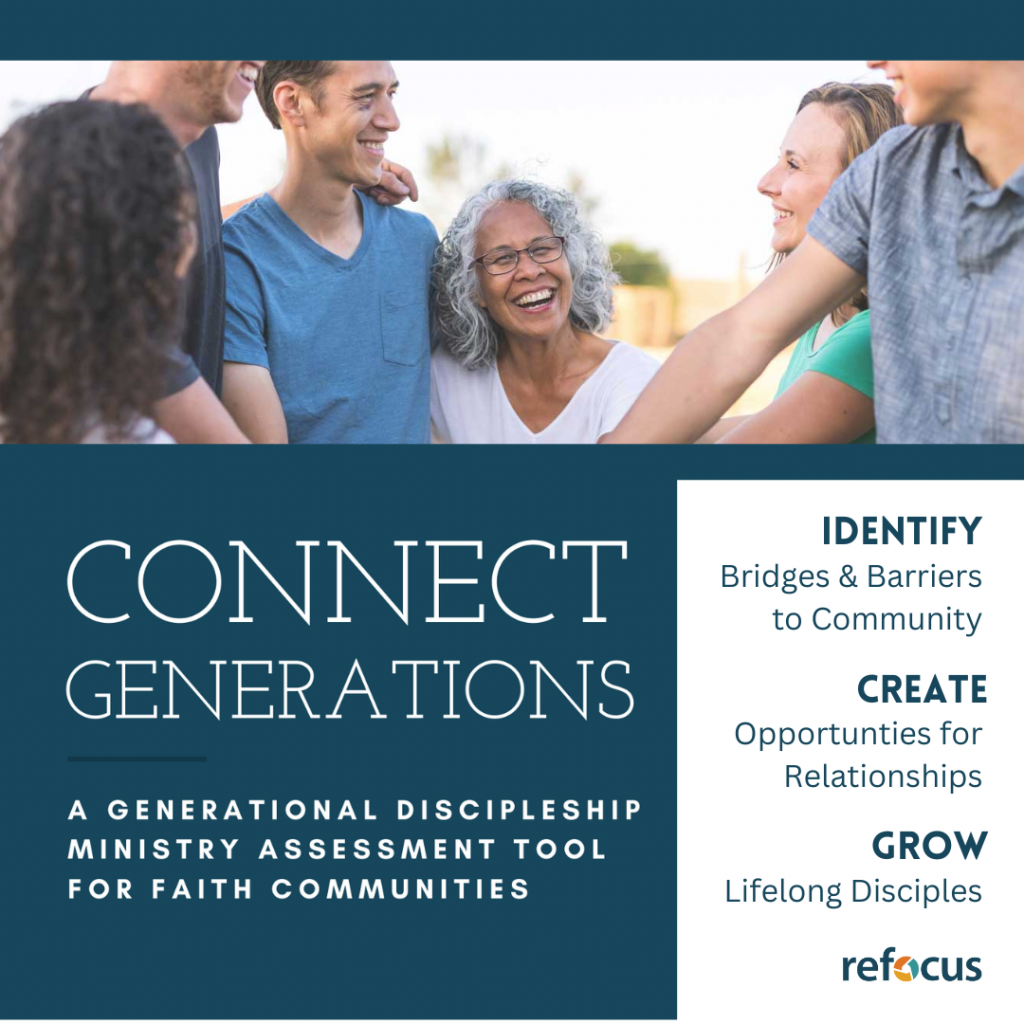“Go, therefore, and make disciples” Matthew 28:19
The call to make disciples isn’t a new one. It is as ancient as the Christian faith, given by Christ himself before His ascension into heaven.
The journey of a disciple isn’t a new phenomenon. Christian Scripture and history are both filled with stories and testimonies of people who have come to know and follow Christ, from young to old, from all over the world.
The information about when that discipleship journey begins for most current Christians isn’t new. In 2015, it was reported that 63% of Christian adults started their discipleship journey between the ages of 4-14 (Source).
But here’s what is new.

This week, Ryan Burge, a political scientist at Eastern Illinois University a pastor in the American Baptist Church, posted these graphs to his Facebook page.
The first is a depiction of the ages currently represented in major Protestant denominations. His comment read, “I don’t think people fully grasp how much of Protestant Christianity is going to die off in the next 3 decades. 68% of Missouri Synod Lutherans have seen their 55th birthday. It’s 57% of Southern Baptists. There’s no major denomination where a majority are under 45 yrs old!”

The second is a series of graphs showing religious affiliation by age demographic. His comment read, “The share of young adults who said they were nones was pretty stable in the 1970s and 1980s. Then it jumped to 20% by 1996. Then went to 32% in 2016. And, now it’s 43% of people under the age of 30 who have no religious affiliation. Nearly doubling in the last fifteen years.”
Last year Barna Group has completed a study focused on children’s ministry that has yielded some important information about how that discipleship journey plays out. Here is what they found: It wasn’t enough for a child to be simply be involved in children’s ministry at their church in order to engage in the formative practices and meaningful characteristics of a disciple. There needed to be more, another integral step, another piece to the puzzle: Relationship.
They discovered that when kids have a meaningful relationship with an adult in the church, they are twice as likely to have an ongoing relationship with the church.
They are three times more likely to be engaged in Scripture including understanding the metanarrative of Scripture and integrating biblical principles in their life.
They are twice as likely to say church matters to them, three times as likely to see church as a highlight in their week, and three times as likely to read the Bible on their own.
The conclusion drawn by the researchers at Barna Group? “The meaningful relationships individuals have as a children fundamentally influence the stability of their future faith.”
Now, here’s the reality check: Only 2 out of 5 kids in children’s ministry have a positive, meaningful relationship with a mentoring adult.
Two. Out of Five. That’s only 40% of kids in children’s ministry at a given church.

Ironically, that’s nearly the same amount who currently express no religious affiliation. Even more telling than that. Only 53% of churchgoing adults identified “Have a loving, caring relationship with an adult” as an outcome for children’s ministry (75% of ministry leaders agreed). That means half of adult church members and a quarter of ministry leaders did not see developing a meaningful relationship between younger and older generations as an identifiable goal and desired outcome for ministry to children.
The call to make disciples has always been here. Our children have always been here. Paul spoke directly to them in the letters he wrote to the church. Jesus put a child in the middle of all his disciples and declared the least to be the greatest in the kingdom of God.
American theologian Reinhold Niebuhr once said, “The great Christian revolutions come not by the discovery of something that was not known before. They happen when someone takes radically something that was always there.”
It is time to take radically the call to welcome children and not hinder them.
It is time for us to create spaces and make room for children and youth and young adults to grow with us, worship with us, learn with us, serve with us, laugh with us, cry with us, question and doubt and argue and debate with us, to be in relationship with us so as to become disciples of Jesus with us.
If we are not cultivating spaces in our churches and faith communities for our youngest and our oldest and all the generations in between to develop meaningful relationships in community and learning, we are missing out on our call to disciple-making.
Go, therefore, and make disciples.

About The Author

Christina Embree is the founder and director of ReFocus Ministry. She holds a masters in ministry focused on Children, Youth, and Family Ministry and is completing her doctoral degree in spiritual formation with a focus on age segregation and intergenerational ministry. In addition to coaching churches of multiple denominations and traditions all around the globe, Christina serves as the Minister of Generational Discipleship for the Great Lakes Conference of the Brethren in Christ and as a pastor at Plowshares Brethren in Christ in Lexington, Kentucky. She is widely recognized as a speaker and author in the areas of generational discipleship, intergenerational ministry, and family ministry. As the mother of three children, she is familiar with the challenges of faith at home and pastoral ministry. She along with her husband Luke share a love for the church, their community, and the global work of peace and restoration through Jesus.



2 Comments
Angie Walker
Oh my goodness!!! I have been having conversations on this for quite a while now. And then you posted this and I was pumped! Thank you. I’ve been searching for resources /curriculum that can guide churches in creating discipleship cradle to grave and I honestly don’t think there is much at all developed yet for this way of doing discipleship with all generations together. It’s rather frustrating. Yet something that desperately needs to happen. And sooner rather than later. The discipleship and spiritual formation resources I see are created first for adults and then silo’s the age groups. That is clearly not working. Why don’t people creating curriculum and resources think of all generations when they create it -ESPECIALLY when the subject is discipleship and spiritual formation ?!
christinamembree
Angie, I completely understand. As it happens, I do have a small bit of curriculum available and I am working on getting more put together. I also have a few resources that might be helpful. If you email me at christina@refocusministry.org I will be happy to send some things your way.